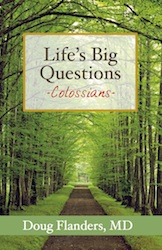
Photo Source: www.pexels.com
A good friend of mine completed his doctorate in Switzerland. During his years of study there, one of his favorite extracurricular activities was hiking the Alps with friends. He loved the crisp clean air, the majestic views, and the well-worn trails beaten into place by centuries of adventurers.
It was a great place to reflect on what lay behind, to wonder about what lay ahead, and to get to know traveling companions in a way that campus life could never replicate.
The trails themselves would merge and split, meandering through the mountains in a seemingly endless and haphazard network. One might come around a corner and find a breath-taking panorama or run headlong into another group of travelers. It was not uncommon to join together with these other wanderers for a brief stretch of trail and then to wave goodbye as the trail divided and each group went their separate ways again.
My friend was fond of saying that life is like those trails: You can never tell what is around the next bend, with whom you might be traveling, or for how long.
Sometimes you remain lockstep with someone for a long time. Sometimes your interactions are brief. Sometimes your paths cross again further down the trail or on your return journey. The key is to enjoy their company for whatever amount of time they are with you, whether long or short.
- Who are some of our “travel companions” along life’s journey? Family? Friends? Long-time co-workers?
- How much say do we have in choosing our travel companions in life? Do we get to pick which people we bump into along the way?
- Who are some of the people you only travelled with briefly, but remember fondly? Did they leave a positive influence on your life that extended beyond their presence?
- Are there people who’ve had a negative influence?
- Do echoes of their negative influence still continue to bother you long after your paths diverged and they walked out of your life?
- What sort of influence are you leaving along life’s way?
What sort of influence are you leaving along life’s way?
I recently met a family who’d spent several months hiking the Appalachian Trail together. This is apparently a very popular thing to do, so they were rarely alone on this adventure. Fortunately, the family had virtually no trouble along the way, despite being out in the open and surrounded by strangers for an extended period of time.
By the time the journey was over, they had all made some new friends. Even more importantly, the family members had bonded with each other in a special way. The extended vacation and novel experiences all contributed to strengthening their love for one another and provided fond memories and funny stories to reflect on for many years to come.
- Do you have any fun family adventures that you remember well?
- What about funny stories from those times that you tell over and over?
- Does your family have “faith stories” that they have accumulated over the years about how God has worked in your life?
- Do those memories make it easier to trust God when you face new challenges?
In today’s passage in John 12:36-50, we learn that the Pharisees were more interested in pleasing men than pleasing God (John 12:43). Some of them liked what Jesus was teaching, but were afraid to be seen with Him (John 12:42). They were more concerned what others thought of them than with what God thought. They were enamored with the temporary and fickle approval of other humans, rather than the permanent favor of the eternal Father.
Can you imagine how odd it would be if we were traveling in the Alps or the Appalachians and treated our friends and family the way the Pharisees treated God? If every time we bumped into someone new, we abandoned our traveling companions to go “buddy up” to the strangers in an attempt to gain their approval and acceptance? Perhaps when the trail divided again, we would wander back to our family and friends, only to run off once more when someone else came along.
As rude and insensitive as this sounds, it describes a pattern of behavior amongst God’s chosen people that has been going on for centuries.
- It is easy to be critical of the Pharisees in hindsight, but don’t we sometimes do the same thing in our own lives?
- Have you ever been slow to share the gospel or even to just speak the truth for fear of offending someone? Are you really afraid of being offensive or more afraid of being thought of as “weird” or “extreme” in your faith?
- What are some other ways we compromise our faith in an effort to gain acceptance?
- Does the church as a whole sometimes compromise just like individuals do? Does our church?
- What are some ways to overcome our natural tendency to be men pleasers rather than God pleasers, both corporately and individually?
There is only one permanent travel companion in this life, and that is God.
He alone is with us from beginning to end. As we travel with Him, we have the opportunity to get to know Him more and more, to build a whole portfolio of faith stories.
Unfortunately, just like the Pharisees, we tend to get distracted by all of the temporary traveling companions we bump into on the trail. One remedy for this is to introduce the people we meet along life’s way to Christ and include Him in our conversations.
If they come to know Him, too, then we will be traveling companions not only for that small stretch of path in this life, but for all of eternity, as well.
NOTE: 
 This post is adapted from my Life’s Big Questions Series, which encourages readers to examine all of life’s questions in the light of Scripture. Whether used for personal devotions, as family discussion guides, or in a study group, this series provides an invaluable resource for enhancing your spiritual walk.
This post is adapted from my Life’s Big Questions Series, which encourages readers to examine all of life’s questions in the light of Scripture. Whether used for personal devotions, as family discussion guides, or in a study group, this series provides an invaluable resource for enhancing your spiritual walk.